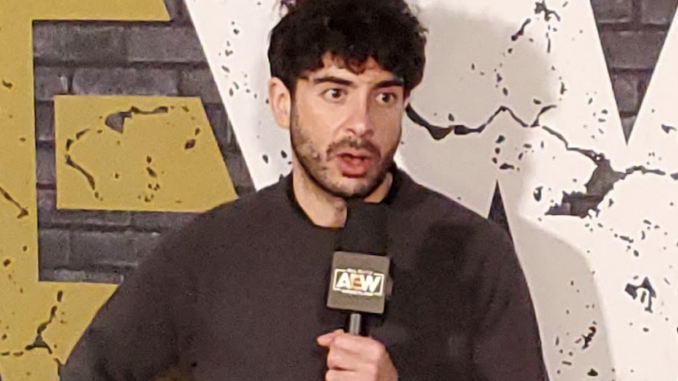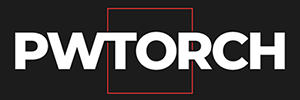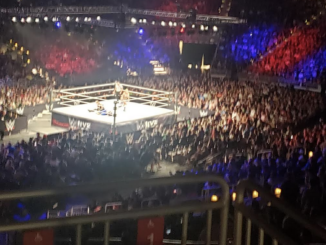
SPOTLIGHTED PODCAST ALERT (YOUR ARTICLE BEGINS A FEW INCHES DOWN)...
This past Mother’s Day, I went to a cookout at my brother’s house, and I had a long conversation with one of my nieces. We talked about her mother’s earring business, raising chickens, and the circumstances that caused her to lose touch with one of her friends. When she mentioned this lost friend, I asked her if she regretted it, and she told me, “I have no regrets,” and I believed her because she is seven.
Plenty of people say they have no regrets, but the ones who actually mean it are either too dumb to know the mistakes they’ve made or too young to have made them at all. The truth is everyone has regrets because everyone makes mistakes. I do, you do, and Tony Khan does, too.
At Double or Nothing last month, AEW made a rare mistake. To be clear, the mistake was not in the matches or in the outcomes of those matches. The mistake wasn’t made by the wrestlers, crew members, or the unusually passive spectators. The mistake was intrinsic, systemic, and had nothing to do with what went on during the actual show; it had to do with what went on beforehand. It had to do with the stories that were told in the build-up to it, or more accurately, in the stories that weren’t.
On PWTorch’s Post-PPV Roundtable (a Podcast exclusive to VIP members), Rich Fann referred to Double or Nothing as AEW’s worst pay-per-view. As much as I love AEW, I have to agree with him, and not just because of how much I respect Rich Fann’s opinions. In this particular instance, I agree with his opinion because his opinion feels correct.
Don’t get me wrong; the matches were good, the wrestling was spectacular, and the performances were memorable. AEW’s worst pay-per-view was still a remarkable pay-per-view that earned its $50 price tag. That is a testament to just how good AEW’s premium content is, but just because Double or Nothing was better than most pay-per-views, that doesn’t mean it was as good as it could be or should be.
Now, I want to be clear. I’m not claiming I could do much better. In fact, I’d probably do much worse. While I’m good at writing and telling stories, that’s about where the “good at” part of my resume ends. I’m not a guru, a savant, or a mastermind. I’m not even good at math.
Tony Khan is smarter than me.
I know this because I have watched Tony Khan give interviews about wrestling, and he is able to rattle off answers I could never think of. He remembers minuscule details about the product he creates and at least half as much about the products others create. He remembers plot points that happened months or even years ago; he is able to connect the vaguest of dots, and he assumes others can do the same.
That assumption is a mistake.
Most people can’t remember where they put their car keys, much less what the Young Bucks were doing on Nov. 13, 2021, and as a result, AEW’s storytelling can sometimes feel disjointed, unfocused, or – in the case of the build-up to Double or Nothing – non-existent.
I’m sure Tony Khan doesn’t see it that way. I’m sure, in his mind, Double or Nothing had a stellar build, but I’m also sure a man of his aptitude could not fail to miss the less-than-minuscule detail of how quiet the crowd was.
I wonder if the crowd’s tempered reaction weighed on Tony Khan at all? Did he think about it in his office, his hotel room, or his private jet? As a fellow perfectionist, I can’t help but imagine that it stuck with him, at least subconsciously, and it might have even contributed to how much better AEW Dynamite was three days later.
I hope that it contributed to how much better AEW Dynamite was because I hope Tony Khan is the kind of person to act on his regrets rather than push them aside and rely on platitudes like, “I have no regrets,” because quite frankly, it isn’t healthy to have no regrets.
I hope that when Tony Khan sat backstage and heard the underwhelming crowd that he felt a tinge of regret. I hope he regretted having not focused more on this event rather than on events coming later in the season; I hope he regretted not investing in some version of a script supervisor, and I hope he regretted allowing this pay-per-view’s storylines to take a backseat to ratings ploys and hot-shotted angles. I don’t say that because I wish him ill will; I say that because I wish him the best.
Regret is a good thing.
Regret is the discomfort that makes us grow, adapt, and make fewer mistakes in the future. I have many regrets, and I will have many more because it is a part of the process of maturing as a person, businessman, socialite, or artist. I personally believe Tony Khan is the kind of person who would harness his regrets and use them to accelerate the progress of what is clearly one of the brightest futures of any new wrestling promoter to ever step onto the sceneTony Khan loves wrestling; he loves his fans and he loves entertaining other people. He also loves learning. This seems obvious to me because you don’t gain a wealth of knowledge as deep as the one Tony Khan possesses if you don’t love learning. Tony Khan has forgotten more about professional wrestling than I will ever know, and I have studied this business like it was a thesis project I’ve been writing since childhood. Given the love he has for learning, I hope he will allow Double or Nothing to be a learning experience for him.
I hope in the future, Tony Khan will choose to sit down with trained storytellers and ask for their advice. I know many fans lament WWE’s decision to hire an army of “soap opera” writers, but the outcomes of that decision were more indicative of WWE’s corporate environment than of what good writers are capable of achieving. As a published author who studied screenwriting at the University of North Carolina School of the Arts, I can assure you that I know enough writers to know that we are a varied bunch of people with a wide swath of skills, styles, interests, and tastes that do not overlap with the vast majority of what happened during WWE’s “PG-Era.”
I’m not saying AEW should be written by an army of “soap opera” writers. I’m not even saying AEW should be written by people outside of the wrestling industry itself. I’m just saying that it doesn’t hurt to ask advice from experts with creative minds, and the best thing about advice is you don’t have to take it.
The mistake Tony Khan made in the build-up to Double or Nothing is easily fixable. All he needs to do is reach out to the people who can help him fix it. Reach out to the storytellers who play with people’s emotions for a living; reach out to the writers who study story structure the way architects study actual structure; and reach out to the kinds of people who aren’t afraid to tell other people when they think they’ve made a mistake.
NOW CHECK OUT MY FULL REVIEW OF DOUBLE OR NOTHING: AEW Double or Nothing 2023 PPV Review: Bryant’s look back at the entire card with match grades and show grade
(David Bryant’s totally normal amount of selfies can be found on his Instagram account @IamDavidBryant, and even more can be found on his Twitter account, which is also @IamDavidBryant because David Bryant is not good at naming things.)




Leave a Reply
You must be logged in to post a comment.